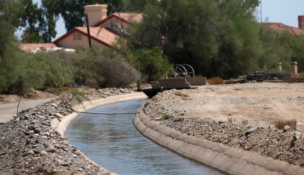Dems set sights on CD1; Republicans aim to narrow scope
Arizona Capitol Reports Staff//April 11, 2008//[read_meter]
Dems set sights on CD1; Republicans aim to narrow scope
Arizona Capitol Reports Staff//April 11, 2008//[read_meter]
High-level Arizona Republicans are nervous that an open seat in the state's First Congressional District could lead to a third loss in two cycles, and they are looking hard for a candidate who can keep the seat in GOP hands. After a series of prominent potential candidates have declined to make a run, though, the party is close to its last chances. And even now those party leaders have been unable to agree on which candidate is better equipped to defend the seat. A memo from the Democratic Congressional Campaign Committee this week pointed to GOP troubles in the district, which Democrats called "disarray" after their rivals have failed to recruit eight potential candidates. For the first time since 2002, the state's sprawling 1st Congressional District is open after Republican Rep. Rick Renzi announced in August he would not seek another term. Renzi, indicted on 35 federal counts ranging from conspiracy to money laundering and fraud, got a reprieve this week when a judge agreed to delay his trial for six months in order to give defense attorneys more time to review evidence. Republicans who have considered and then passed on making a run for the seat include former state Senate President Ken Bennett, Arizona Corporation Commissioner Kris Mayes, state Sens. Tom O'Halleran and Jake Flake, State Reps. Bill Konopnicki and Andy Tobin, party activist Steve Pierce and businessman Lewis Tenney. Only conservative activist Sydney Hay, president of the Arizona Mining Association, has declared her intention to run. In advance of the June 4 filing deadline, Republicans are re-recruiting Bennett and Mayes, though different camps are advocating on behalf of each. Third District Congressman John Shadegg and 6th District Congressman Jeff Flake each have spoken with Bennett about the race, and multiple sources told the ~Arizona Capitol Times~ that consultant Nathan Sproul and businessman and automotive dealer Jim Click are working hard to get the former Senate president into the contest. Multiple sources outside Sen. Jon Kyl's office also say the state's junior senator has been involved in recruiting Bennett as well, though Kyl's office would not confirm whether he had been active in the effort. On the other side, consultant Chuck Coughlin, the president of prominent lobbying firm HighGround, and veteran political strategist Paul Hickman, who serves as Sen. John McCain's top aide in Arizona, had pushed Mayes to make her bid official. Hickman said McCain himself is not involved in any discussions over candidates. But Mayes surprised some Republicans by announcing in a press release sent on April 10 that she would not run. Hay was in Washington this week meeting with activists and interest groups as well as raising money. In an interview, she pointed to endorsements from pro-life groups and organizations that favor gun rights, and she dismissed some Republican fears that she may be too conservative for the district. Some Republicans in both Arizona and Washington compare Hay to 2006 candidate Randy Graf, an anti-illegal immigration activist who lost the 8th District to Democrat Gabrielle Giffords by 12 points in 2006. But her head start, Hay contends, will give her an advantage over any other GOP challengers. "I'm way out ahead, I'm raising money, I've got significant fundraising going," Hay said on her way to a Washington-area airport to head back to Arizona. "To start from zero would be real tough for anyone. "We're working hard to coalesce the Republicans around my candidacy," said Hay, who came close to beating the current incumbent when he won the Republican primary in 2002. Her previous bid, she said, is going to help her as well. "It is a decided advantage having run before," she said. The 1st Congressional District is the 10th largest congressional district in the nation, spanning south and west from the four corners and covering the Navajo nation, Flagstaff and some communities, such as Florence and Casa Grande, south of Phoenix. This year, national Democrats have settled on former State Rep. Ann Kirkpatrick of Flagstaff. Through the end of the year, Kirkpatrick had raised just more than $400,000, and will report an additional $260,000 raised through the first three months of this year, Democratic insiders said. A source close to the campaign also said Kirkpatrick will report between $460,000 and $470,000 cash on hand. If Kirkpatrick wins, she would be the first Democrat to represent the seat since Rep. Karan English lost to Republican J.D. Hayworth in 1994, when the area was in the 6th Congressional District. Before she can turn her sights on the eventual Republican nominee, Kirkpatrick will have to get past former television reporter Mary Kim Titla and attorney Howard Shanker in the Sept. 2 primary. Shanker this week picked up an important endorsement from 7th District Congressman Raul Grijalva. The scramble to fill the seat is a situation Republicans are facing throughout the country. The party has failed to field competitive candidates in Senate races in New Jersey, South Dakota, Iowa and Montana, four states where incumbent Democrats may have been vulnerable, while failing to field any candidate against a freshman Democrat in Arkansas. Republicans recruited a flawed candidate in Illinois to fill the seat of former House Speaker Dennis Hastert, and last month a Democratic scientist and businessman, a political neophyte, won the special election. Throughout the country, Republicans are facing what could prove to be a repeat of last year's Democratic landslide. At a briefing with reporters this week, Democratic Congressional Campaign Committee Chairman Chris Van Hollen, of Maryland, stressed that only once has the party benefiting from a "wave election" picked up seats two years later; in 1976, Democrats gained a net of one seat after winning 49 seats in 1974, when Republicans felt a strong backlash from Watergate. "We think that we are in a position to beat history," Van Hollen told reporters. Between freshmen and endangered Democrats and targeted Republicans around the country, Van Hollen said as many as 75 races could be contested this year. Democrats have taken aim at the open seat in the 1st Congressional District and at Shadegg's 3rd Congressional District – though Republicans said that's a stretch – while Republicans are excited at the prospect of taking back Rep. Harry Mitchell's 5th District and Giffords' 8th District. The heavy focus on the Southwest – Democrats are also seriously competing for all three congressional seats in New Mexico and in two districts in Nevada – comes as waves of new voters migrate from around the country to the Sun Belt, where population has exploded. The two fastest-growing congressional districts in the country are Flake's 6th District, which grew by 36 percent between 2000 and 2005, and Republican Rep. Trent Franks' 2nd District, which expanded by 34 percent in the same period, according to the Almanac of American Politics. Because of its rapid growth, Arizona is expected to get two more congressional districts after the 2010 reapportionment. Both parties see the Sun Belt as an emerging target, both on the battlefield for control of Congress and the White House. In future years, though, Republicans are going to need to actually recruit candidates if they hope to hold the line against Democrats.
















